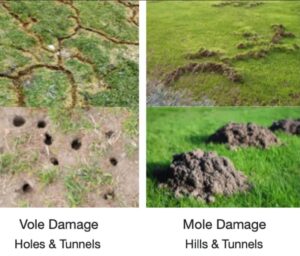Got Moles or Voles?
So far, in 2025, we are actually seeing more damage from Voles than Moles. Voles are basically field mice, and they feed on the roots of plants, seeds, and plant foliage. They often take up residence in old, decayed root balls and also in abandoned mole tunnels. Moles are very territorial so typically you don’t see a lot of mole activity and vole activity at the same time. Once the moles have exhausted the worms in the area, they will abandon the tunnels, and the Voles will take up residence. Mole damage that people see in their lawns are from raised up tunnels or actual excavation piles on the surface the moles pull out of the tunnels.
Voles typically use abandoned mole tunnels or above ground routes and often make micro grass tunnels or barely subsurface tunnels that reduced their visibility to Predators like Hawks, but they don’t dig long, deep soil tunnels like moles. Under soil tunnels that voles use are either abandoned mole tunnels or tunnels that have formed under stump root system.
Basically, a “vole tunnel” look like an inverted mole tunnel. You will often see an area that caves in one to two inches instead of being pushed up soil above ground like moles. See pictures.
A typical vole hole is only about 1.5 inch in diameter and a clean entrance and exit. If they have taken up residence around root balls, they may make much larger holes.

There is a new bait called Volex that is safe around pets and only targets rodents. If you have questions about Vole control, please call us at 615-472-8245.
